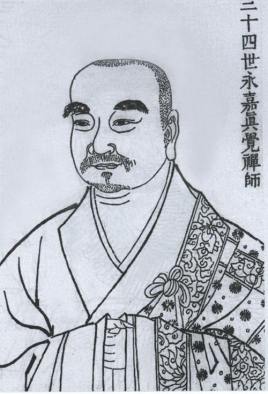Bodhidharma
Baizhang Huaihai
Caoshan Benji
Dahui Zonggao
Daman Hongren
Danxia Tianran
Dayi Daoxin
Dazhao Puji
Dazhu Huihai
Dazu Huike
Deshan Xuanjian
Dongshan Liangjie
Dōgen
Eisai
Guifeng Zongmi
Guishan Lingyou
Guizong Zhichang
Heze Shenhui
Hongzhi Zhengjue
Huangbo Xiyun
Huanglong Huinan
Huineng
Jinshan tanying
Linji Yixuan
Longtan Chongxin
Luohan Guichen
Mazu Daoyi
Nanquan Puyuan
Nanta Guangyong
Nanyang Huizhong
Nanyue Huairang
Niutou Farong
Qingliang Wenyi
Qingyuan Xingsi
Sengcan
Shishuang Chuyuan
Shitou Xiqian
Tianhuang Daowu
Xiangyan Zhixian
Xitang Zhizang
Xuansha Shibei
Xuedou Chongxian
Xuefeng Yicun
Yangqi Fanghui
Yangshan Huiji
Yantou Quanhuo
Yaoshan Weiyan
Yongjia Xuanjue
Yongming Yanshou
Yunmen Wenyan
Yunyan Tansheng
Yuquan Shenxiu
Zhaozhou Congshen
Index
Yongjia Xuanjue

born
665
died
712
ACHV
Song of Enlightenment
religion
Chan, Tiantai
POSTH name
Master Wuxiang (without phenomena)
teacher
Dajian Huineng
works
Song of Enlightenment, Yongjia Collection
Contents
Biography
The Overnight Guest
Biography
Yongjia Xuanjue was born in 665 in present-day Wenzhou in Zhejiang Province, China. The city went by the name of Yongjia at the time, and he came to be named for his birthplace later in life. He began studying Buddhism at an early age as a monk in the Tiantai school and was given the dharma name Mingdao (明道), meaning "bright path". He was friends with Xuanlang (玄朗), who would go on to become the fifth patriarch of Tiantai. He settled at Lung-hsing temple in Wenzhou, where he remained teaching until his death in 713. He was prominent enough that after his death, the Emperor Xuanzong gave him the posthumous name Wuxiang (無象), meaning "without phenomena". His two works that survive today are the Song of Enlightenment and the Yongjia Collection.
The Overnight Guest
The story of Yongjia's brief first encounter with Huineng is recorded in the Transmission of the Lamp. The tale tells of one of Huineng's students encountering Yongjia, and through conversation finding that his opinions were very similar to those of the great Zen teachers of the time. When asked who his teacher was, Yongjia replies that he had none, but rather he had attained his understanding from sutras, especially the Vimalakirti Sutra. Huineng's student then explains that one's understanding should be confirmed, to which Yongjia requests that he testify to his enlightenment. The student states that his own personal opinion is meaningless, and he should instead visit Huineng in Caoxi.
Arriving at the temple, Yongjia walks around Huineng three times and then stands staring at him. Huineng comments on his lack of formality, to which Yongjia responds, "Since the question of incessant rebirth is a momentous one and death may come at any moment, I have no time to waste on ceremony, and wish you to give me a quick answer to this problem". Huineng suggests he "embody birthlessness" in order to overcome impermanence. Yongjia immediately displays understanding of this, but then readies himself to leave. Huineng asks if he is not leaving too quickly. Yongjia then says there is no such thing as "quickly", for motion does not truly exist. Huineng asks why this should be the case, to which he responds that any distinction about quickness or slowness is an artificial construct. Huineng then exclaims that his interlocutor now truly understands the concept of birthlessness, but Yongjia cleverly asks if a mere concept, another form of artificial distinction, can really have a meaning. Huineng asks, "Who makes a distinction about whether there is a meaning or not. Yongjia responds, "Distinctions are meaningless!", and Huineng cries, "Excellent! Excellent! Now, just stay here a single night!" This is so that Huineng can officially confirm his enlightenment. And thus, Yongjia is known as "The Overnight Guest" because he proved his enlightenment to Huineng in one night.
Despite this story, in the oldest version of the Platform Sutra found among the Dunhuang manuscripts, which dates to about 850 CE, Yongjia is not mentioned as a student of Huineng.
Contact us
Disclaimer
Comments
© Copyright Jumpypixels.com